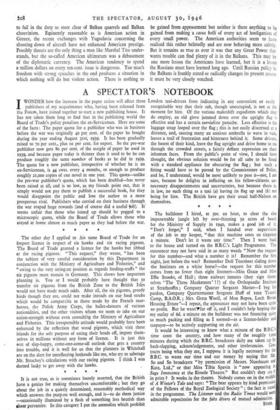A SPECTATOR 'S NOTEBOOK
IWONDER how the increase in the paper ration will affect three publishers of my acquaintance who, having been released from the Forces, have joined together to start a new publishing house. It has not taken them long to find that in the publishing world the Board of Trade's policy penalises the ex-Serviceman. Here are some of the facts: The paper quota for a publisher who was in business before the war was originally 40 per cent, of the paper he bought during the year ending August 31st, 1939. It has been gradually raised to 70 per cent., plus to per cent, for export. So the pre-war publisher now gets 8o per cent, of the weight of paper he used in 1939, and because paper today is thinner than it used to be he can produce roughly the same number of books as he did in 1939. The quota for a new publisher, irrespective of whether he is an ex-Serviceman, is 44 cwts. every 4 months, or enough to produce roughly 21,000 copies of one novel in one year. This quota—unlike the pre-war publisher's quota, which has been doubled—has never been raised at all, and is so low, as my friends point out, that it simply would not pay them to publish a successful book, for they would disappoint the public and lose the author to a more prosperous rival. Publishers who carried on their business through the war reaped huge rewards (and of course did a useful sob). It seems unfair that those who joined up should be pegged to a microscopic quota, while the Board of Trade allows those who stayed at home almost as much paper as they had before the war.


























 Previous page
Previous page